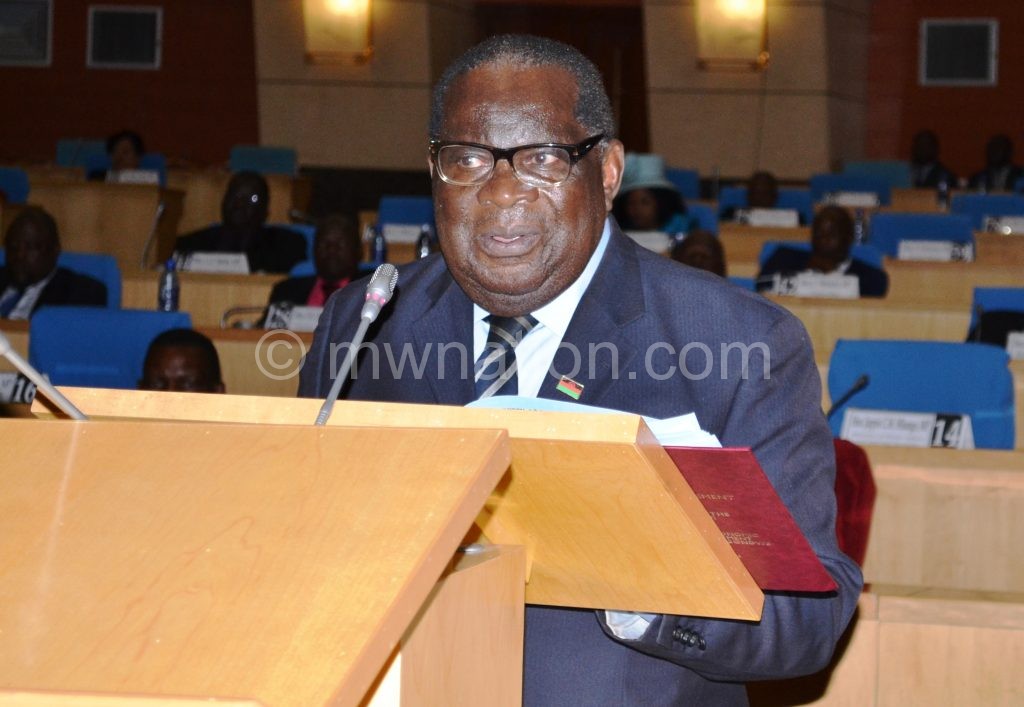Eyebrows over k7bn maize deal
- Govt had few options—Gondwe
- Donors not taking it lightly
Government’s maize procurement deal with a Dubai-based company which is sourcing it on behalf of Admarc at a cost of K7.3 billion (about $105 million) has raised eyebrows of some donors at a possible overpricing, and over Treasury’s role in the deal.

But Ministry of Finance has allayed fears that government has deliberately jumped into a bad deal, saying government was motivated by the desire to ensure that no single person dies of hunger.
The supply credit agreement, according to Finance Minister Goodall Gondwe, will see government paying the company around $105 million with a 2 percent interest rate up to 2018.
According to the terms of the deal, government will not pay back the loan with interest for the first two years.
However, concerns that the deal is overpriced, particularly with the figure increasing with interest, led members of the diplomatic community to confront government on the matter, a source has confided in Nation on Sunday.
The source, who sought anonymity, added that the donor community is further unhappy that government is bent on fast-tracking the deal despite the said concerns.

The donors, according to the source, are also concerned about the capacity of the maize supplier, an intermediary who is going to procure over 100 000 metric tonnes from Brazil and Ukraine.
“There is the shadow of Cashgate where contractors with no experience were paid an awful amount of money to supply materials or undertake contracts they had no experience in. If you check the company on its website, there is only scanty information on what it does,” he said.
The source said the concerns were communicated to the finance minister during a meeting this week which he had with a group of donor representatives, where one Western envoy allegedly challenged the figures government is being quoted by the supplier.
“The donors are not taking it lightly. This is an issue of utmost urgency for them,” added the source.
The major bilateral donors United Kingdom, the European Union and Germany, through their diplomatic missions in Lilongwe, had not responded to questionnaires on the matter as we went to press.
But in an interview, Gondwe confirmed meeting the donors and cited Germany Ambassador Peter Woeste as one of the diplomats who discussed with government the matter.
Nation on Sunday efforts to reach Woeste, who is concluding his tour of duty in the country, proved futile.
Gondwe, however, insisted that government had already signed the deal with the Dubai-based company as it has “few options on the table” amid a looming hunger.
The minister said government had signed an agreement with the company, which in turn has obtained a loan from PTA Bank to procure 100 000 metric tonnes of maize for Malawi government [charging $287 dollars per kilograme plus logistics costs].
Said Gondwe: “We think we are doing the best in the situation. If the donors think we can get the maize anywhere else cheaper, they should show us; we will see if we are going to be proved wrong, but we think we are dealing with a credible supplier and that this is a good deal.”
“We had sourced 100 000 metric tonnes of maize here at K250 per kilogramme and went to Zambia and South Africa and
purchased another 100 000 metric tonnes. The drought, however, affected the whole region and now we cannot find maize in the region and decided to buy it in Ukraine and Brazil. We found this supplier and we believe he is giving us good conditions.”
He said government would only cancel the contract if the supplier fails to live up to the terms of the contract, but confirmed that government has already sent a delegation to inspect the maize consignment in Germany, where it has been warehoused.
The delegation comprises Deputy Secretary to Treasury Peter Simbani, Newby Kumwembe from Ministry of Agriculture and Admarc CEO Foster Mulumbe.
In a separate interview, Treasury spokesperson Nations Msowoya also confirmed the meeting between donors and government.
However, Msowoya said the two sides agreed that the matter be solved with due-diligence of the contract to ensure government is using a fair deal.
Msowoya also defended the role of Treasury in the deal: “Treasury is a guarantor of the loan, so we need to be involved.






Why do crooked people not get satisfied with the abundant resources they have already swindled from the poor? If that amount of money was invested in winter cropping involving commercial farmers we could have far much greater benefits. Why is the Green Belt Initiative not operating at its optimum when we could invest such moneys for both the short term and long term success of the GBI?
Does K7.3bn translate to $105m? Why do journalists in Malawi *always* display such low numeracy skills? Is the outrage over the $105m amount, or over the K7.3bn? You see how important it is to be always accurate?
Let’s look at the numbers quoted.
It cannot be true that the price of the foreign-supplied maize is $287 per tiny kilogram. Perhaps they mean $287 per metric tonne. Then 100,000 tonnes will cost $28,700,000 which is ABOUT 20 billion kwacha.
On the other hand, if the price of the foreign-supplied maize is 287 kwacha per kilogram, then 100,000 tonnes will come up to 28.7 billion kwacha, which is ABOUT $41,000,000.
Conclusion: I have no faith in the numbers being quoted here by The Nation.
Why is government using a third party? Can maize not be procured directly from the suppliers? The donors have a point. Using third parties is prone to corruption.